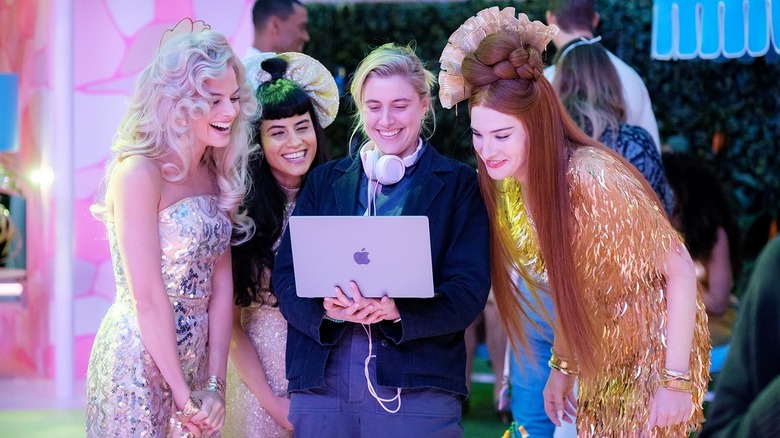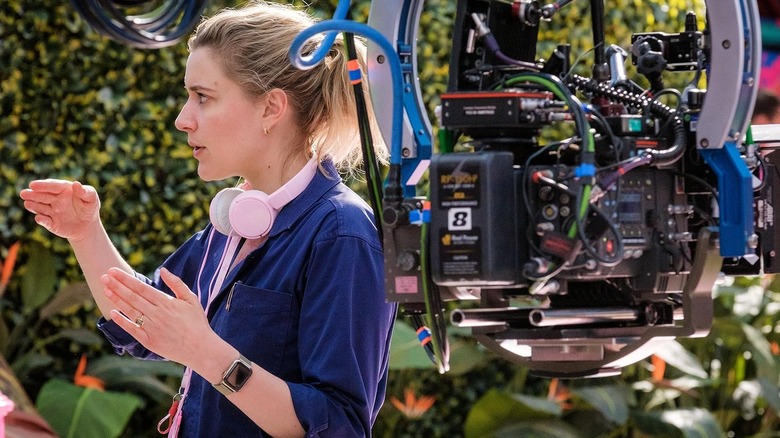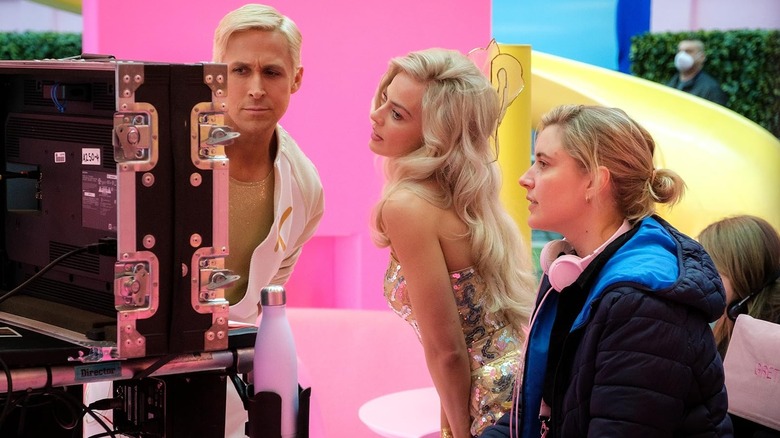Barbie Director Greta Gerwig Not Getting An Oscar Nomination Is Shameful, Frankly
It's difficult to argue too much with the Academy's nominees for Best Director at the 96th Academy Awards (you can read the full list of nominations here). Justine Triet ("Anatomy of a Fall"), Martin Scorsese ("Killers of the Flower Moon"), Christopher Nolan ("Oppenheimer"), Yorgos Lanthimos ("Poor Things"), and Jonathan Glazer ("The Zone of Interest") all made impeccably crafted films, each with their own distinctive style and something meaningful to say about the times we live in. And yet, there's a glaringly obvious absence from the lineup — the woman who gave us the other half of "Barbenheimer," Greta Gerwig.
Gerwig herself is an Academy favorite, having previously racked up a trio of Oscar nods — including one for Best Director — for her first two solo directorial efforts on "Lady Bird" and "Little Women." She also snagged a nomination for her and Noah Baumbach's "Barbie" script, so it's not as though her peers are completely overlooking the fact that she took what could have been a glorified toy commercial and instead delivered a surprisingly existential love letter to Golden Age movie musicals that, as /Film's BJ Colangelo observed, "weaves the idea of Barbie within the parameters of our own patriarchal society and muses on how the expectations of women aren't so different than what is expected of Barbie."
Nevertheless, in what constitutes a real-life example of what America Ferrera's Gloria was talking about in her "Barbie" monologue about the conundrum of being a woman, it appears that directing one half of the biggest and most acclaimed motion picture event of 2023 (one that also not so secretly kept the film industry afloat during a strike that saw studio executives fighting tooth and nail to avoid treating their actors and writers fairly) wasn't enough to score Gerwig a Best Director nod.
The 'wrong' kind of blockbuster
We probably should have seen this coming, huh? Just as films aimed at women (you know, that group of people that makes up a sizable percentage of the world's population) have historically been underestimated at the box office, so too have films like "Barbie" typically been given the short shrift when it comes to discussions concerning their artistic merit. I'm not going to try and convince you that "Barbie" is the best film of 2023 — it wasn't even my favorite film of the year! With that being said, it's hard not to feel like Gerwig and, by extension, her movie was scrutinized in ways that it wouldn't have been, had it been geared towards men.
Take "Oppenheimer," a film that, like other Christopher Nolan works, explicitly spells out its themes and messages through its dialogue (so much so that, at times, it feels as though the movie's characters are addressing the audience as much as one another). So why it is, then, that "Barbie" is the film that gets raked over the coals for being just as "unsubtle" with its social commentary? And why is it that esteemed filmmaker Oliver Stone felt perfectly comfortable dismissing "Barbie" as being "part of this infantilization of Hollywood" before even seeing it, yet refrained from declaring "Oppenheimer," I dunno, "Dad Movie Nonsense" or some equivalent moniker ahead of time?
Stone, to his credit, has since apologized for "speaking ignorantly" about "Barbie" and more or less acknowledged that his previous comments were based on his preconceptions of the film, but that just goes to prove my point: A movie like "Barbie" is deemed "low art" until otherwise proven innocent (even with an established auteur like Gerwig at the helm), whereas a film like "Oppenheimer" receives the opposite treatment.
The IP of it all
Okay, okay, so that comparison might not be entirely fair. After all, "Oppenheimer" is an R-rated adult drama that was shot largely in black and white, and treats incredibly topical historical subject matter with the severity that it demands. It's only to be expected that film buffs would take it more seriously than "Barbie," a brightly-colored four-quadrant comedy based on a hugely popular multimedia franchise, going in. Movies like "Oppenheimer" are in short supply, whereas IP adaptations like "Barbie" have taken over the media landscape these past couple of decades (and, like it or not, aren't going anywhere anytime soon).
Therein lies the thing that makes Gerwig's direction on "Barbie" so impressive. In an age where brands like Marvel Studios are presented as the auteurs behind films rather than their directors, Gerwig managed to fully leave her artistic mark on a big-budget feature inspired by a world-famous doll. Where Nolan was allowed to cook in peace while shooting "Oppenheimer" (as well he should have been), Gerwig was constantly butting heads with Mattel executives to realize her creative vision for "Barbie," even when it went "off-brand." In other words, she accomplished the seemingly impossible in today's world and delivered a legitimately director-driven tentpole, just like we cinephiles have been begging for.
As I said earlier, though, there isn't a blatantly undeserving candidate I would immediately kick out of this year's Best Directors roster to make room for Gerwig. Nor am I arguing there aren't other filmmakers who might've deserved to make the cut; it would be a tough call no matter what. But Gerwig more than earned a spot in this year's Best Director conversation, and the fact that she didn't get one is a real shame indeed.
Don't worry, Greta. You'll always be more than Kenough in our hearts.


